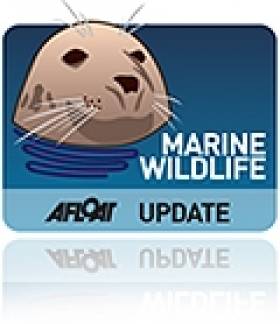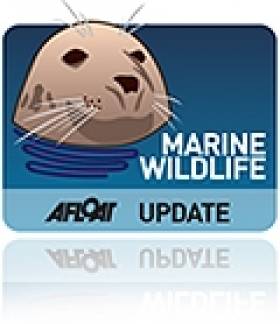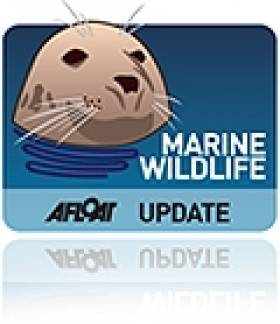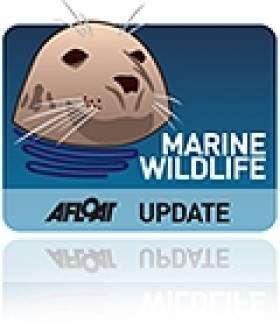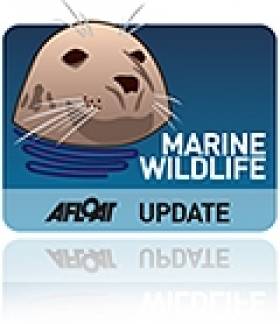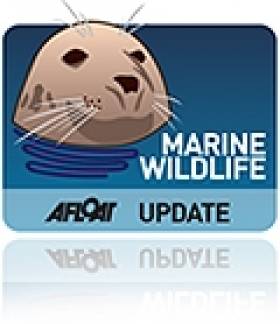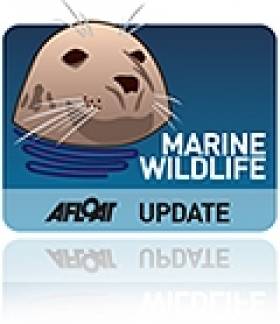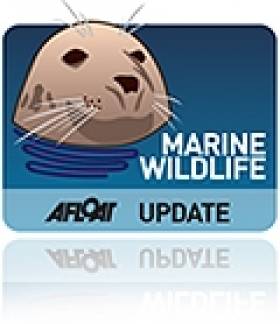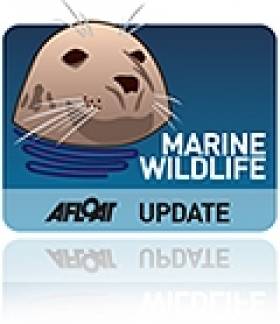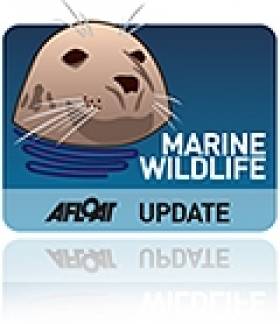Displaying items by tag: Dolphins
West Cork Weekends Will Bring You Closer To Marine Wildlife
#MarineWildlife - If you've ever wanted to get closer to Ireland's marine wildlife, a new series of weekend excursions in West Cork may be just the ticket.
The Southern Star reports on the 'Discover Wildlife Weekends' being run from Rosscarbery by local company Ireland's Wildlife starting this April, where those taking part will be led by expert guides to explore the coastal region and have the best opportunities to spot the many species of whales and dolphins that visit our shores.
Weather permitting, the weekends will also involve some offshore whale watching in the company of 'whale watch supremo' Colin Barnes and the Irish Whale and Dolphin Group's (IWDG) sightings co-ordinator Pádraig Whooley.
And birdwatching will also be a feature, as West Cork is a hotspot for our feathered friends - from merlins and peregrine falcons to coastal waders and more exotic fowl that skirt our coasts on their spring migrations.
The Southern Star has much more on the story HERE.
Meanwhile, marine sector stakeholders have expressed their concerns over the designation of six new offshore marine areas by the National Parks and Wildlife Service.
As previously reported on Afloat.ie, the six sites at Blackwater Bank in Wexford, the West Connacht coast, Hempton's Turbot Bank in Donegal, the Porcupine Bank Canyon off Kerry, the South-East Rockall Bank, and the stretch from Rockabill to Dalkey Island off Dublin have been proposed for designation as Special Areas of Conservation (SACs) to protect marine habitats and species listed on the 1992 EU Habitats Directive.
But at a recent meeting at the Irish Farm Centre in Dublin, a coalition of fish farmers, fishermen and marine energy stakeholders have hit out at what they characterise as "the appalling handling of inshore designations since the 1990s by the State", which they claim "has resulted in hundreds of job losses and a flight of serious investment" from Ireland's coastal areas.
“Our experience of the Irish Government’s application of the EU Habitats Directive has been a saga of mismanagement, foot dragging and buck-passing which has left over 500 fish farming licences in limbo for over 10 years and a backlog of red tape and bureaucracy which could see producers waiting until 2020 and beyond for simple renewals which are vital to underpin their businesses," said IFA aquaculture executive Richie Flynn.
"These new offshore SACs will have the same effect of preventing any fishing, marine energy or aquaculture being carried out in these areas if left in the hands of the same agencies to manage."
Recent Dolphin, Whale Strandings 'Very Unusual' Says IWDG
#MarineWildlife - The Irish Whale and Dolphin Group (IWDG) has described as "very unusual" a mass stranding of common dolphins on Achill Island last week - which was followed this week by the remains of cetaceans washed up in Kerry.
At least eight common dolphins were found dead on Keel Beach, Keem Beach and Dookinella on the Co Mayo island at the end of January.
And The Irish Times reports that two pilot whales and an "otherwise healthy" dolphin were found washed up at Cuas Croom near Cahirciveen in the last few days.
Commenting on the former incident, IWDG stranding officer Mick O'Connell said: "While there are occasionally live strandings involving groups of dolphins, it is very unusual in this country to see this number of dead dolphins washed ashore over a 10km area."
Strandings of deceased dolphins have also been reported in Donegal, and the IWDG's Simon Berrow suggests that the recent severe weather experienced around Ireland's coast may be a factor.
'Frontier' Surveyors Meet Sperm Whales and Killer Whale
#MarineWildlife - Sperm whales and a killer whale were among the finds on the last big effort of this year's Cetaceans on the Frontier survey led jointly by the Galway-Mayo Institute of Technology (GMIT) and the Irish Whale and Dolphin Group (IWDG).
As previously reported on Afloat.ie, marine scientists from GMIT's Marine and Freshwater Research Centre are on board the RV Celtic Explorer to carry out the fourth dedicated survey of cetaceans on the continental shelf edge.
The ship was surveying a zig-zag pattern in the Atlantic yesterday 2 February, some 55 nautical miles west-by-northwest of Achill Island (visible on this map HERE) when the team encountered at least two sperm whales, though an elusive third may also have been present - as indicated by the hydrophone being towed 200m behind the vessel.
"The blows continued and as we got closer, more and more body of the surfacing whale could be seen until we were treated to some reasonable views of the steep nose, long flat back and stumpy dorsal fin on initial surfacing followed by a thick tail stock with ‘knuckles’ seen when flaking," writes Niall Keogh on the Cetaceans on the Frontier blog.
Soon after that, the researchers were treated to their first sight of a killer whale in Irish waters - followed by a number of pilot whales surfacing close to the ship.
First Whales Of The Year Caught On Video
#MarineWildlife - Here's a little something cheerful to brighten up this chilly, snowy Monday morning: some video footage from YouTube shot by Irish Whale and Dolphin Group (IWDG) member Karl Grabe of the first whales to visit Ireland's shores in 2013.
As previously reported on Afloat.ie, the first sightings were made last week on the maiden member whale-watching trip on board the IWDG's new marine wildlife research vessel Celtic Mist off the coast of Wexford.
In addition to these fin whales, the group also made the acquaintance of a group of frolicking dolphins from the 'superpod' spotted in the Irish Sea recently, as you can see from the clip below:
First Whales of 2013 Sighted Off Wexford
#MarineWildlife - The whale watching season is well under way off the coast of Wexford, as the Irish Whale and Dolphin Group (IWDG) reported its first sightings of 2013 this week.
Just an hour into the maiden cetacean spotting voyage of the IWDG's new research vessel Celtic Mist at the weekend, members of the group were treated to the sight of fin whales and minke whales feeding south of Hook Head - not to mention some of the 'superpod' of dolphins seen last week in the Irish Sea.
And as World Irish reports, local wildlife ranger Tony Murray spotted the first humpback whale of the year in the same area.
Murray suggested that "a large herring haul going on in the southeast at the moment" is the main attraction for the ocean giants and their smaller, more plentiful companions.
The IWDG's Facebook page has a photo gallery containing some stunning snapshots of the day's excursion HERE.
Researchers Film Dolphin 'Superpod' In Irish Sea
#MarineWildlife - BBC News has some incredible footage of a 'superpod' comprising hundreds of dolphins in the Irish Sea captured this week.
The video was shot by surprised researchers with the Wales-based Sea Trust on one of the groups routine survey expeditions between Fishguard and Rosslare on board the Stena Europe ferry.
Cliff Benson of the marine wildlife charity described the sea as "boiling" with dolphins just 10 miles off the Irish coast yesterday morning.
"They were just coming and coming. It was the last thing on earth I was expecting in the winter," he said. "We had at least 250 and that's a conservative estimate. I'm guessing there was as many as 500."
The incredible sight comes just a month after the researchers recorded what they called a "dolphin-fest" along the same route west of Tusker Rock, numbering more than a 100 dolphins and 26 porpoises.
BBC News has more on the story HERE - and more footage is available HERE via RTÉ News.
Dolphins Make a Noise in the Shannon Estuary
#Dolphin - YouTube user Karl Grabe from Cork has uploaded this wonderful snippet of dolphins vocalising in the Shannon Estuary.
The audio comes from the website for Listening to the Deep Ocean Current (LIDO), which collects a number of live hydrophones collecting the sounds of dolphin activity and other marine wildlife in locations around the world.
Six New Marine Sites Chosen for Conservation
#MarineWildlife - Minister for Arts, Heritage and the Gaeltacht Jimmy Deenihan announced on Wednesday the proposal of six new marine sites for designation as Special Areas of Conservation (SACs) to protect marine habitats and species listed on the 1992 EU Habitats Directive.
The six sites around the Irish coast represent habitats (sandbanks and reefs) and/or marine wildlife (specifically dolphins and porpoises) identified as insufficiently represented in the list of Irish SACs at the EU Commission's Marine Atlantic Biogeographic Seminar in 2009. These sites are:
- Blackwater Bank, Co Wexford (Sandbank)
- West Connacht Coast (Bottlenose dolphin)
- Hempton’s Turbot Bank, Co Donegal (Sandbank)
- Rockabill to Dalkey Island, Co Dublin (Reefs and harbour porpoise)
- Porcupine Bank Canyon, off Kerry (Reefs)
- South-East Rockall Bank (Reefs)
The designation of marine SACs is scheduled for completion in Europe in 2012, and according to the minister, this list of six additional SACs will constitute Ireland’s contribution to that process.
In a statement, the department said: "These six SAC sites will protect a range of habitats and species including sandbanks, deep sea coral reefs, dolphins off the Atlantic coast and harbour porpoises found in Dublin Bay.
"These sites are part of a European network of nature conservation sites known as Natura 2000 which was established with the aim of preserving our rich natural heritage for future generations."
Among the new designations are two offshore sites at the Porcupine Bank Canyon and the South East Rockall Bank "contain excellent examples of offshore fauna associated with geogenic reef (ie reef made of rock). Considering the extent of Ireland’s offshore maritime area alongside the value and vulnerability of deep sea biodiversity therein, these two sites represent a modest but highly significant contribution to the Irish SAC network."
Two new inshore areas are being proposed in the west of Ireland to protect the bottlenose dolphin. The department is currently co-funding a multi-annual research programme to further understand the ecology of this species in this coastal region.
Meanwhile, the inshore site off Dublin from Rockabill to Dalkey Island is also being proposed both for the harbour porpoise, and for geogenic reef to address a gap in the SAC network for this habitat type in the northern part of the Irish Sea.
As previously reported on Afloat.ie, the oil exploration company behind the Dalkey Island Prospect has spoken out over the Rockabill to Dalkey Island designation, claiming it had not been given advance information of the decision.
Providence Resources says maps provided by the department appear to show and overlap between the location for a seismic survey and the new SAC area, which would make any development for resource extraction "extremely problematic".
Last week the Irish Whale and Dolphin Group (IWDG) expressed concern over the potential impact of the 2D seismic survey at Dalkey Island on harbour porpoises in Dublin Bay.
Irish Sea 'Teeming' with Dolphins Says Wildlife Charity
#MARINE WILDLIFE - Large numbers of dolphins have been filmed in the Irish Sea off the Welsh coast by wildlife volunteers, as WalesOnline reports.
The conservationists with the Sea Trust charity, based in Pembrokeshire, recorded the "dolphin-fest" from the deck of the Stena Europe ferry en route from Fishguard to Rosslare.
Sea Trust director Cliff Benson confirmed the sighting of "a pod of eight Risso's dolphins, 40-plus common dolphins [and] four porpoises" among others as soon as the ferry headed west of Tusker Rock.
Altogether in the three-hour passage across the Irish Sea, the volunteer surveyors recorded a total of 99 common dolphins, 10 Risso's dolphins and 26 harbour porpoises. "That's not bad for a winter trip," said Benson.
He added that while there are threats to the Irish Sea's cetaceans from scallop dredging and the like, "to date our surveys show this area is teeming with life.
“This is Wales and Ireland we are talking about not Bermuda so get this amount of dolphin and porpoise activity with whales thrown in as well is incredible."
Stena has welcomed Sea Trust volunteers on board its vessels since 2004 to check on cetaceans and other marine wildlife in the waters between Ireland and the UK on a monthly basis.
And as reported previously on Afloat.ie, Seatruck Ferries has also been providing free passage to UK marine wildlife researchers to discover how many dolphins and seabirds make their home in the Irish Sea.
Meanwhile, BBC News reports that a pod of more than 100 bottlenose dolphins was recently spotted off the Isle of Man.
The Manx Whale and Dolphin Watch said it received a number of sightings from the east and west coasts of the island in the northern half of the Irish Sea, reporting a hive of activity.
"The group sizes tend to be relatively ginormous," said Tom Felce of the group. "So if they are here you can't miss them."
Dancing Dolphins Surprise Researchers Off Donegal
#MARINE WILDLIFE - Marine researchers off the coast of Donegal were recently treated to a rare dolphin dance by a 50-strong pod, as IrishCentral reports.
The video above captures the same pod witnessed by researchers with the Irish Basking Shark Project, who were in the area off Inishowen to observe basking sharks in the coastal waters when they were surprised by the gregarious dolphin congregation.
A spokesperson for the project confirmed to IrishCentral that such large groupings of dolphins are unusual for the area, which has welcomed more than its fair share of large marine wildlife over recent months.
As previously reported on Afloat.ie, one of the first confirmed sightings of killer whales on the Irish coastline was recorded earlier this summer when a family of orcas from the Scottish Hebrides visited the same waters at the mouth of Lough Swilly.
Meanwhile, WorldIrish reports on the heartwarming tale of a Dutch couple who have bonded with Dingle's most famous non-human resident, Fungie the dolphin.
Jeannine Masset and Rudi Schamhart, who now live in Annascaul, have visited the friendly cetacean for 21 years, and their connection has inspired a fanpage on Facebook that has received responses from Fungie fans around the world.
"Fungie has enriched our lives and we want to give something back to him by offering our friendship and companionship to him," said Jeannine, "and he lets us know over and over again that he really appreciates it."



























